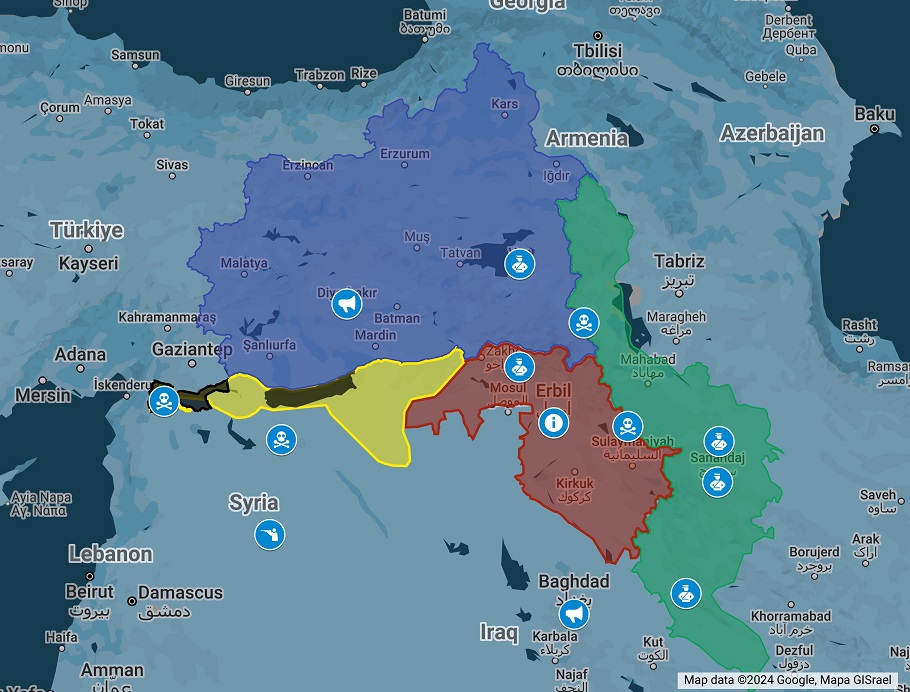1.5K
A weekly brief of events occurred in the Kurdistan regions of Iran, Iraq, Syria, and Turkey.
Iran
- Iraqi and Turkish officials revealed a planned Turkish military operation targeting the Kurdistan Workers’ Party (PKK) in Iraq to Asharq al Awsat. Per the report, Iran has approved the operation, as Iranian-backed militias are becoming a “crucial partner” in Turkey’s war on the PKK. Turkish President Recep Tayyip Erdogan held a phone conversation with Iranian President Ebrahim Raisi on Monday and has threatened to launch additional incursions into Iraq and Syria on multiple occasions, most recently during a speech on Sunday. The semi-official Iranian outlet Mehr News claimed Raisi hoped that “the cooperation between Tehran and Ankara would lead to securing the interests of the two nations and increasing unity among the Islamic ummah.”
- Iranian border guards wounded at least six Kurdish border porters (kolbars) last week. Two more kolbars died after falling from a cliff near Sardasht, and another succumbed to frostbite in Urmia. The Hengaw Organization for Human Rights reported the Iranian regime killed four kolbars and wounded 54 in March. Concomitantly, Senna’s Islamic Revolutionary Court sentenced a teenage kolbar to two years in prison and 77 lashes. In Diwandara, a sibling of a murdered protester was sentenced to three years and three months in prison for membership in a Kurdish opposition party. Lastly, regime security forces arrested another famous singer in Ilam for participating in Newroz celebrations.
Iraq
- On April 1, Iraq’s Independent High Electoral Commission (IHEC) closed registration to parties and coalitions seeking to run in Iraqi Kurdistan’s June 10 parliamentary elections. The Kurdistan Democratic Party (KDP) did not register and reaffirmed its boycott protesting recent Federal Supreme Court rulings against Iraqi Kurdistan, one of which annulled eleven quota seats in the Kurdistan Parliament reserved for Christians and Turkmen. Several Christian and Turkmen parties have joined the KDP’s boycott. At the same time, U.S. Ambassador to Iraq Alina Romanowski met with top KDP and Kurdistan Regional Government (KRG) officials in Erbil to discuss the June 10 elections. On Monday, a KDP spokesperson conditioned the party’s electoral participation on “fixing the method of conducting elections.”
- Eight U.S. Republican lawmakers submitted a letter to President Joe Biden that urged him to require Iraqi Prime Minister Mohammed Shia al Sudani to allow the resumption of Iraqi Kurdistan’s oil exports via Turkey. The letter expressed “deep concern” over the Biden administration’s plan to host al Sudani at the White House on April 15. The lawmakers also demanded the Biden administration halt the transfer of U.S. dollars to Iraq until the Department of the Treasury certifies such transfers do not benefit Iran or its proxies.
Syria
- On March 27, ISIS (Da’esh) terrorists launched an attack on an administrative office for the security forces in Raqqa. The assault resulted in the deaths of two officers and left a civilian injured. The Syrian Democratic Forces (SDF) reported the arrest of one terrorist, with ongoing efforts to apprehend others involved in the attack. Concurrently, the Syrian Observatory for Human Rights (SOHR) documented the beheading of eight Syrian soldiers by the terror group, while three others perished in battles in the Syrian Desert. The Russian warplanes also carried out dozens of airstrikes in the area, including in Raqqa. Separately, retired US General Frank McKenzie told ABC News of the growing threat posed by Da’esh, including attempts to target the US. Recently, SOHR reported that six Da’esh terrorists were smuggled by Turkish proxies from occupied Afrin to Turkey.
Turkey
- Turkey’s ruling Justice and Development Party (AKP) suffered significant losses in local elections for the first time since 2002 on Sunday. Turkey’s main opposition party, the Republican People’s Party (CHP), won 35 provincial municipalities to the AKP’s 24. The pro-Kurdish Peoples’ Equality and Democracy Party (DEM Party) won ten municipalities. Concurrently, the CHP won 14 cities in metropolitan elections, including Ankara, Istanbul, Izmir, Bursa, and Adana. The AKP won 12 cities, and the DEM Party secured victory in ten. Turkey’s Supreme Election Council announced 78.11 percent of eligible voters cast ballots in Sunday’s elections. Kurdish votes played a key role in the Istanbul mayoral election, as incumbent Akram Imamoglu defeated his AKP opponent by a margin of 51-39 percent. Granted, the co-chair of the DEM Party’s Istanbul branch Meral Bestas said Istanbul’s Kurds voted for Immaoglu to punish the AKP and that Istanbul’s mayor should not claim Kurdish votes as his own. The DEM Party won the majority of provincial and metropolitan elections in Turkey’s Kurdish region and scored big wins in Diyarbakir (Amed), Van, and Mardin. Millions of Kurds celebrated the DEM Party’s successes in the streets once the results were announced. Despite the DEM Party’s gains and the AKP’s losses, however, DEM Party officials accused the Turkish government of sending thousands of military personnel and police officers to vote in Kurdish areas amid irregular voting hours. DEM Party Co-chair Tülay Hatimoğulları gave a victory speech to celebrate the party’s successes and, referring to the AKP, said, “The war alliance was defeated.” President Erdogan admitted his party’s defeat and failure to achieve “desired results” during a speech on Sunday but, as previously stated, also threatened new invasions of Iraq and Syria. On Tuesday, the electoral board in Van revoked the victory of the Kurdish candidate and granted the mayorship to the candidate of the ruling party, citing a verdict by the Ministry of Justice banning the winner from the DEM Party. Abdullah Zeydan, the Kurdish candidate, had been a political prisoner for seven years, but Turkey’s supreme court allowed his candidacy. DEM Party officials rejected the government’s action, describing it as a repetition of the trustee system, in which the government replaced dozens of elected Kurds with appointed trustees.

